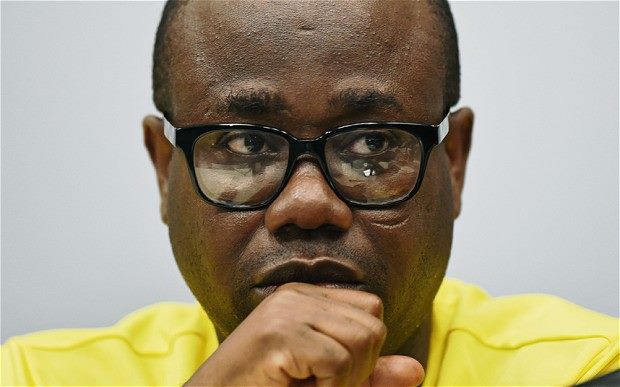Kwasi Nyantakyi, the former President of the Ghana Football Association (GFA), has publicly aired his grievances against the ruling New Patriotic Party (NPP), expressing profound disillusionment over the ongoing prosecution of his court case. Nyantakyi, once a prominent figure in Ghanaian football and politics, had anticipated that the NPP, a party he significantly contributed to, would intervene and effectively dismiss the charges against him. This expectation stemmed from his belief in his close relationship with the party and his past contributions to their electoral successes. However, the NPP’s perceived inaction has left him feeling betrayed and abandoned by the political establishment he once supported. His disappointment is evident in his recent interview, where he voiced his frustration with the protracted legal battle, contrasting his alleged offenses with the severity of the ongoing proceedings.
Nyantakyi’s legal troubles began with the release of Anas Aremeyaw Anas’s explosive #Number12 exposé, a documentary that unveiled alleged corruption within African football. The exposé implicated Nyantakyi in bribery scandals, leading to accusations of fraud and corruption, and subsequently, his downfall from the pinnacles of football administration. He was stripped of his positions within both the GFA and the Confederation of African Football (CAF), where he served as Vice President. The ensuing legal proceedings have cast a long shadow over his career and reputation, contributing to his growing resentment towards the NPP for their perceived lack of support. He maintains his innocence, claiming he has neither misused government funds nor committed any violent crimes, questioning the rationale behind the continued legal pursuit against him. This perceived injustice fuels his sense of betrayal by the NPP, a party he believed would stand by him, especially given his past contributions.
The #Number12 exposé not only triggered legal ramifications but also significantly impacted Nyantakyi’s political aspirations. He had harbored ambitions of contesting the Ejisu parliamentary seat, believing that his standing within the NPP and his influence within the constituency would guarantee him success. However, his involvement in the scandal created a significant roadblock to his political ambitions. The NPP, perhaps wary of the negative publicity surrounding Nyantakyi, ultimately denied him the party’s nomination. This decision further solidified his feeling of abandonment by the party, adding another layer to his already deep-seated disappointment. He had envisioned that his potential candidacy, particularly a successful one, might have influenced the course of his legal battles, possibly leading to their dismissal. This hope, now dashed, contributes to his present disillusionment.
Nyantakyi’s expectation of the NPP’s intervention was likely rooted in the perceived close relationship he enjoyed with the party hierarchy and his instrumental role in their past electoral victories. He likely believed that this history of mutual support and shared success would translate into tangible assistance during his time of need. The NPP’s decision to distance themselves, perhaps driven by a desire to protect their own image in the face of the scandal, stands in stark contrast to Nyantakyi’s anticipated support. This perceived betrayal is a central theme in his recent pronouncements, reflecting the breakdown of a relationship he once considered strong and reliable. The unfulfilled expectation of support, coupled with the ongoing legal proceedings and the thwarted political aspirations, has left him feeling isolated and aggrieved.
The lack of intervention from the NPP likely stems from a complex interplay of political considerations and legal realities. While Nyantakyi might have expected loyalty and support based on past contributions, the party likely prioritized damage control in the wake of the #Number12 exposé. The scandal, with its far-reaching implications for African football, placed immense pressure on the NPP to distance themselves from Nyantakyi. Any overt intervention in his legal case could have been interpreted as condoning corruption, potentially jeopardizing the party’s reputation and public standing. Furthermore, the legal process, once initiated, follows its own course, independent of political influence. The NPP, even if willing, might have been limited in its ability to directly intervene in the judicial proceedings. This combination of political pragmatism and legal constraints likely contributed to the NPP’s perceived inaction, fueling Nyantakyi’s sense of betrayal.
In conclusion, Kwasi Nyantakyi’s public expressions of disappointment reflect a deep sense of betrayal by the NPP, a party he had served and supported with the expectation of reciprocal loyalty. The #Number12 exposé, which triggered his legal troubles and derailed his political ambitions, has exposed what he perceives as a breach of trust. While Nyantakyi anticipated intervention and support, the NPP likely prioritized safeguarding its own image and respecting the independence of the legal process. This divergence of expectations and realities has left Nyantakyi feeling abandoned and disillusioned, marking a significant rupture in his relationship with the party he once considered an ally. His ongoing legal battles, coupled with his thwarted political aspirations, serve as a constant reminder of this perceived betrayal, further exacerbating his frustration and disappointment with the NPP.


